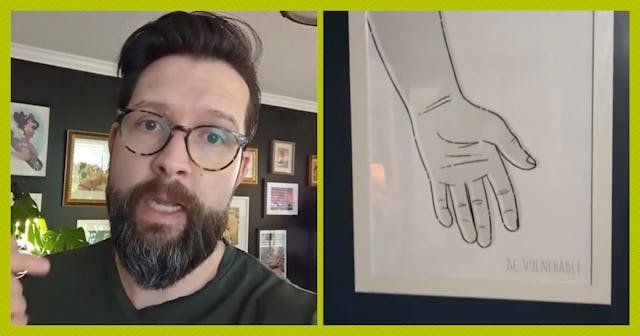TikTok Dad Reveals The Three Words His Family Uses Instead Of "Live, Laugh, Love"
And they’re actually really wonderful and touching.

Though we’re living in the year 2023, there’s no doubt that millions of young boys are still growing up, being taught to “be a man.” The issue here is that being “a man” is usually synonymous with toxic traits our patriarchal society uses to describe masculinity.
One TikTok user pointed out that those toxic traits are typically the opposite of the ones encouraged to little girls growing up — empathy, nurturing, connection, and care.
“All of those things are bad. All of those things are negative,” TikTok user Ashley emphatically explains in a now-viral TikTok.
“Any emotion that is outside of happiness, anger, or horniness — you're gay. You're a pussy. The worst you can be. So, then these boys grew up and become men, and they look around and realize, ‘Wow, I don't actually have a meaningful connection with anyone, 'cause I never knew how.’”
One TikTok dad stitched Ashley’s video, affirming her position on the problem with raising boys and showing how he and his wife are actively working against those kinds of toxic gender norms in order to raise emotionally healthy sons.
And it’s really touching and wholesome.
“So, my wife and I, we kind of talked about what is our family all about and for me, personally, what is masculinity all about, and we came up with our own kind of “Live, Laugh, Love,” artist and dad Austin Light begins in his video.
He then shows his followers a wall in his sons’ room, showcasing three large art prints.
“I am an illustrator. So, I visualized these three words. It's not ‘live, laugh, love,’ but it is three words,” he explained.
First up, Light pans to a beautiful art print of hand, reaching out for something. For the Light family, this hand represents the first word in their mantra: vulnerable.
“So, to us, there's nothing more courageous, nothing braver than being vulnerable, than showing your emotions, talking about what you're going through, talking about how you're feeling. So vulnerability is super important,” Light says.
Next, Light pans to the second art print featuring two hands, slowly coming together yet not fully intertwined.
“The next one is “be kind,” Light says. “Vulnerability begets kindness. So what that means is that when you are vulnerable, other people usually are vulnerable themselves.”
“That's how they respond to that. That's empathy. So to us, it's says, ‘Hey, when you're vulnerable, people will show you kindness, or if you see vulnerability, you should respond with kindness yourself because it's appreciated.’ Because again, it's a very courageous thing to do. Also, kindness is an action. It's not just being nice, it's doing something.”
Last up, Light shows the third installment in the art series, the two hands fully embraced in a tender hold.
“And then finally — “Be confident.” So, after you've been vulnerable, and you're kind, confidence is something that comes from knowing that you're not the only one going through this. You're not the only one that feels this way.”
Light explains that this confidence is especially important for men to learn, so they can know they are not alone, feeling comfortable to reach out when feeling vulnerable.
“That's kind of our ‘live, laugh, love,’ if you will. They are the bedrock to our family. And to me, the bedrock of authentic masculinity that I am teaching my two sons. It has been in this room that they share for their entire lives, right next to their Five Nights at Friday's poster and their Detective Pikachu poster,” he jokes.
After the post went viral, beyond the several users who begged Light to make the prints available for purchase, others praised the parents for their progressive teachings.
“Are millennials going to raise the greatest generation ever?” one user wrote.
Another said, “Listen, where do you all come from? I need (not for romance) men like this in my life.”
One mom-to-be chimed in and said, “I love this. Im pregnant with my 1st baby a boy and it’s so important to instill masculinity but not the toxic kind.”
This article was originally published on